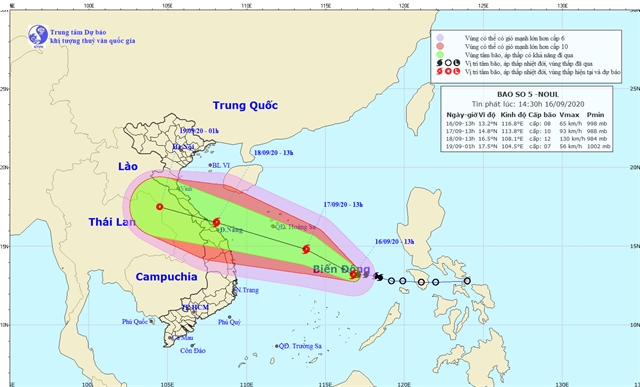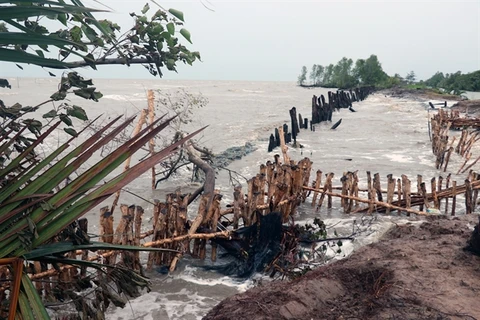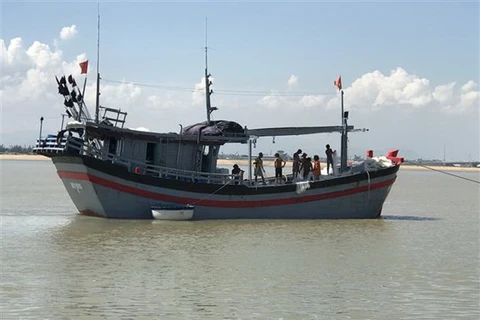Hanoi (VNA) - Noul, the fifth storm to enter the East Sea this year, is gaining strength, heading to the central region of Vietnam and is expected to make landfall on September 18.
According to Mai Van Khiem, Director of the National Centre for Hydro-Meteorological Forecasting, the storm would directly affect central provinces, especially Quang Binh, Quang Tri, Thua Thien-Hue and Da Nang with wind speeds of 90-100 km per hour and sometimes hitting 135 km per hour.
Heavy rain will blanket the central provinces from September 17 afternoon to September 18 night, he said, warning about high risk of flash flood and landslides in the central region.
By 1 pm on September 16, the storm’s eye was about 680 km away to the south east of Hoang Sa (Paracel) with the strongest wind of 60-75 km per hour, sometimes reaching 90-100 km per hour. The storm is moving west-northwest.
It’s expected that by 1pm on September 18, the storm eye will be on the waters close to provinces from Quang Binh to Quang Ngai with wind at the storm eye reaching 100-135 km per hour or more.
After making landfall in central provinces from Quang Binh to Da Nang on September 18 afternoon or evening, the storm would be weakened to become a tropical low pressure.
About 1am on September 19, the heart of the tropical low pressure is on the border area of Lao and Thailand with strongest wind reducing to 40-50 km per hour.
Meeting with ministries and agencies on Wednesday morning to make preparations, Deputy Prime Minister Trinh Dinh Dung raised alert levels, calling for active and timely actions to respond to the storm’s movements.
He asked localities, border guards and the transport sector to tighten control over the operation of fishing vessels and tourist ships at sea so the vessels/ships would avoid entering storm-affected areas and find safe shelter.
By 10am on September 16, border guards informed 285,384 people on 58,345 vessels about the storm and instructed them to keep away from possibly affected areas.
According to Border Guard Command, by September 17 morning, about 700 vessels were in the areas possibly affected by the storm. The number does not include vessels/boats/ships that are operating in coastal areas.
Dung asked localities to instruct vessels to head to shelters, ensure safety for human life and property, particularly assist people to move/reinforce aquaculture growing facilities as the central region was a hub of aquaculture production with high economic value in Vietnam.
Localities were also asked to have evacuation plans in place to ensure safety for people living in vulnerable areas like coastal areas, river mouths and landslide/flood-prone areas.
Anti-flood measures must be taken into account to protect urban areas and agriculture production.
The Deputy PM asked for review and promptly fix problems at dams and reservoirs of hydropower plants.
Now, many reservoirs in the central region are dry, so their operators must closely oversee and adjust the storage of water to ensure the reservoirs’ safety.
He assigned specific tasks to ministries and agencies, urging them to make use available resources for actively, effectively and timely responding to the storm.
Vice head of the Central Steering Committee for Natural Disasters Prevention and Control Tran Quang Hoai said that proper attention must be paid to reservoirs because damages were found at 55 reservoirs in the central region including 16 ones Thanh Hoa, ten in Nghe An, eight in Ha Tinh, 12 in Quang Binh, six in Quang Tri and three in Thua Thien-Hue.
Another 41 reservoirs are under construction and 99 locations along key sea dyke system from Thanh Hoa to Da Nang need to be protected when the storm makes landfall.
There are also 26 dyke works including 13 carried out on sea dyke system or rivers mouths are being built./.
According to Mai Van Khiem, Director of the National Centre for Hydro-Meteorological Forecasting, the storm would directly affect central provinces, especially Quang Binh, Quang Tri, Thua Thien-Hue and Da Nang with wind speeds of 90-100 km per hour and sometimes hitting 135 km per hour.
Heavy rain will blanket the central provinces from September 17 afternoon to September 18 night, he said, warning about high risk of flash flood and landslides in the central region.
By 1 pm on September 16, the storm’s eye was about 680 km away to the south east of Hoang Sa (Paracel) with the strongest wind of 60-75 km per hour, sometimes reaching 90-100 km per hour. The storm is moving west-northwest.
It’s expected that by 1pm on September 18, the storm eye will be on the waters close to provinces from Quang Binh to Quang Ngai with wind at the storm eye reaching 100-135 km per hour or more.
After making landfall in central provinces from Quang Binh to Da Nang on September 18 afternoon or evening, the storm would be weakened to become a tropical low pressure.
About 1am on September 19, the heart of the tropical low pressure is on the border area of Lao and Thailand with strongest wind reducing to 40-50 km per hour.
Meeting with ministries and agencies on Wednesday morning to make preparations, Deputy Prime Minister Trinh Dinh Dung raised alert levels, calling for active and timely actions to respond to the storm’s movements.
He asked localities, border guards and the transport sector to tighten control over the operation of fishing vessels and tourist ships at sea so the vessels/ships would avoid entering storm-affected areas and find safe shelter.
By 10am on September 16, border guards informed 285,384 people on 58,345 vessels about the storm and instructed them to keep away from possibly affected areas.
According to Border Guard Command, by September 17 morning, about 700 vessels were in the areas possibly affected by the storm. The number does not include vessels/boats/ships that are operating in coastal areas.
Dung asked localities to instruct vessels to head to shelters, ensure safety for human life and property, particularly assist people to move/reinforce aquaculture growing facilities as the central region was a hub of aquaculture production with high economic value in Vietnam.
Localities were also asked to have evacuation plans in place to ensure safety for people living in vulnerable areas like coastal areas, river mouths and landslide/flood-prone areas.
Anti-flood measures must be taken into account to protect urban areas and agriculture production.
The Deputy PM asked for review and promptly fix problems at dams and reservoirs of hydropower plants.
Now, many reservoirs in the central region are dry, so their operators must closely oversee and adjust the storage of water to ensure the reservoirs’ safety.
He assigned specific tasks to ministries and agencies, urging them to make use available resources for actively, effectively and timely responding to the storm.
Vice head of the Central Steering Committee for Natural Disasters Prevention and Control Tran Quang Hoai said that proper attention must be paid to reservoirs because damages were found at 55 reservoirs in the central region including 16 ones Thanh Hoa, ten in Nghe An, eight in Ha Tinh, 12 in Quang Binh, six in Quang Tri and three in Thua Thien-Hue.
Another 41 reservoirs are under construction and 99 locations along key sea dyke system from Thanh Hoa to Da Nang need to be protected when the storm makes landfall.
There are also 26 dyke works including 13 carried out on sea dyke system or rivers mouths are being built./.
VNA























